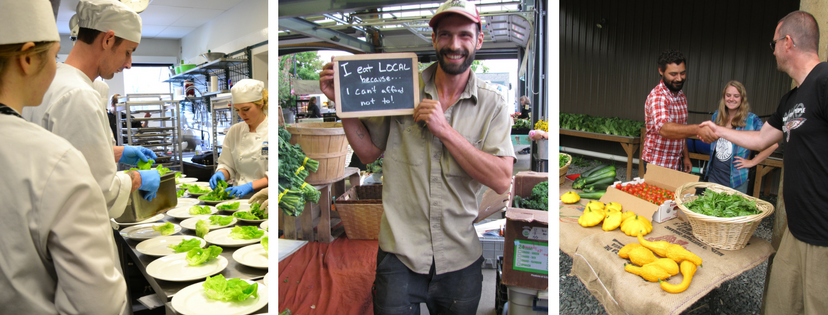
By Maressa Valliant
Food & Farming Marketing Coordinator
I often have the wonderful opportunity to converse with people at community events. There are several basic questions that come up to establish some common ground like: “Where are you from?”, “How long have you lived in Bellingham?”, and “What brought you here?”. It doesn’t take much time to land on things you have in common for why you both love Bellingham or Whatcom County. I can almost guarantee that some of these are in the top 3:
- It’s just so beautiful!
- There’s so much to do!
- The people are so nice!
- The food and beverage scene here is incredible!
At Sustainable Connections, we are dedicated to supporting businesses that are striving to create, and nurture these qualities. Local businesses are our largest employer collectively and the backbone of our local economy. We work with them regularly and in the light of many conversations around the new minimum wage law, we want to help educate our community about what this may mean for customers and food businesses.

Enjoying local squash at Ciao Thyme
Last year, Initiative 1433 passed with an overwhelming majority to increase the minimum wage in the state of Washington from $9.47 per hour to $11.00 per hour and it will continue to increase in increments of .50 each year until it reaches $13.50 on January 1, 2020. (Full text of initiative 1433 can be found here) In addition, it was mandated that employers also provide paid sick leave. Voters spoke loud and clear, indicating that we all care about living wage jobs that provide a good quality of life for everyone.
In light of these changes, restaurants especially, are having to restructure and or modify their policies and procedures. Part of measure 1433 also prohibited the pooling of tips. (In most restaurants, when you tip a server they get majority of those tips. They will often pool a small percentage of their tips to distribute to staff in the kitchen and back of the house. This is no longer allowed, which would potentially mean that the wage gap between servers and cooks would grow larger). In light of this, many businesses are moving toward a service charge model to help spread out wages more equally throughout their staff. For example, when you visit Ciao Thyme on Unity Street in Bellingham, you will notice their service charge disclosure on their menus and a note at the service counter that reads “In order to keep our business and employees thriving, we are replacing tipping with a service charge system in 2017. This allows us to budget more effectively and distribute funds more equitably to all members of the Ciao Thyme team through wages and benefits.”
The response from the community has been mostly positive, but we all know that change is never easy. The cultural practice of tipping is so deeply ingrained in our dining behaviors, that modifying or doing away with it is understandably going to raise questions. And, we really hope that you ask them!

Average Breakdown of Each Dollar Spent at a Restaurant
We have taken time to gather restaurant owners, chefs, market managers, and other food business owners to talk about the benefits, challenges, and solutions to make upcoming changes as smooth as possible. What we heard time and again was that they want customers to know that their commitment to the best levels of service will never change, and they want to hear your feedback and questions.
They were also eager to share information about where their dining dollars go. For businesses that are committed to sourcing the very best fresh, local ingredients, the cost of food and beverage alone is generally 30% of the cost you see on the menu. When you consider the cost of doing business for a restaurant: another 39% for staff wages and benefits, 11% for rent, 13% for supplies, utilities, marketing, etc… the profit margin becomes very narrow. For many food businesses their margin rarely exceeds 7%. (see chart for average breakdown of each dollar spent at a restaurant)
Because margins are tight, changes to staffing costs will mean a shift of some kind. Whether we see a slight increase in prices, a switch to service charges or other kinds of solutions, it is important for us to remember all that it takes to bring us a delicious plate of food, and to stay open and curious. When we support businesses who are prioritizing the care of their employees we help ensure the place we call home is brimming with happy, healthy people and healthy businesses.
You can read more about how other individual businesses like the Community Food Co-op, Aslan Brewing, Woods Coffee, and others are planning for and adapting to the changes in this Bellingham Business Journal article published earlier this year. If you have questions or concerns, we encourage you to ask them! Knowledge is power, and mutual understanding nourishes healthy relationships between businesses, patrons, and our community as a whole.
